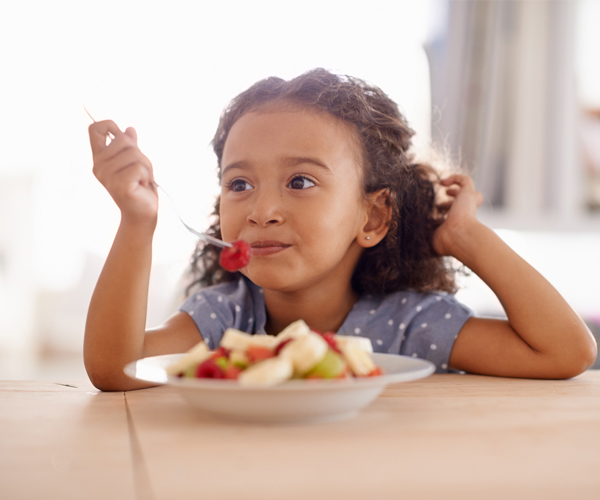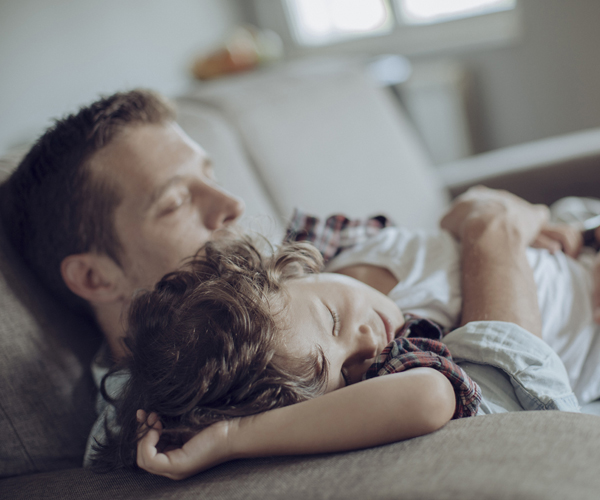The Busy Parent’s Guide to Losing Weight
Kids have a knack for making even the simplest tasks approximately six billion times harder — just ask any parent who’s ever taken a toddler to the grocery store.
So it’s no surprise that losing weight, which is challenging enough under the best circumstances, can feel downright impossible once kids enter the picture.
If your newborn didn’t get the memo about sleeping through the night, or your toddler has a tendency to rise and shine at 4 a.m., it can be hard to find the time or energy to do much of anything, let alone work out or cook a healthy meal from scratch.
Add to that the pressure to spend every single solitary second bonding with your little ones, and it’s no wonder many parents are tempted to put their weight-loss goals on the back burner for a while — like, say, until their kids go off to college.
“I have to admit, before I had children, I didn’t fully understand how you don’t have time to get a healthy meal on the table or wake up 30 minutes earlier to exercise,” says Rima Kleiner, M.S., R.D., and blogger at Dish on Fish, based in Greensboro, North Carolina.
“Now, as a parent of two young children, I completely get it — middle-of-the-night wake-ups thwart early-morning exercise sessions, and pre-dinner meltdowns inspire take-out meals. It’s difficult to stay motivated if you’re exhausted or feel guilty about taking care of you.”
But while it’s not always easy to make your weight-loss goals a priority while you’re juggling the incredibly-fulfilling-yet-totally-exhausting demands of parenthood, there are a few tricks to make it work.
9 Weight Loss Tips for Busy Parents
Stop cleaning your kids’ plates
A few bites of mac and cheese here, a handful of Goldfish crackers there — if you make a habit of finishing whatever food your kiddos leave behind, you may find yourself “eating for two” long after your baby arrives.
But when you’re watching your calories, those extra bites add up fast.
“While these little habits seem like they wouldn’t add that many calories, you’d be surprised,” Kleiner says. “Just eating an extra 10 calories a day for a year results in one pound gained in a year.”
And let’s be real — considering there are 10 calories in a single nacho chip, those leftovers probably add up to a lot more than that.
Relearn from your toddler what it means to eat intuitively

If your kid has ever chased five cookies and two bowls of ice cream with a tall glass of chocolate milk, then you know kids don’t always make solid nutritional decisions when left to their own devices.
(And by “left to their own devices,” I obviously mean “visiting their grandparents” — and yes, that bender ended exactly how you’d expect it to while driving home from your parents’ house.)
Still, some believe we can learn a few things by eating like a two-year-old.
Apparently, kids are better than adults at “intuitive eating” — they eat without hang-ups, so they don’t obsess about cravings and forbidden foods.
And they stop when they’re full, even if their parents are begging them to pleeeease just eat those last two bites of dinner so we can all leave the table.
“Kids are pretty adept at responding to their hunger and fullness signals,” says Adina Pearson, R.D. and blogger at Healthy Little Eaters.
“They will eat as much as they’re hungry for, and they’re done when they’ve had enough.”
And if they occasionally overdo it, no biggie.
(Unless you’re the one cleaning the minivan, but I digress.)
Deconstruct your dinners
If you’re trying to cut back on refined carbs but your picky eater is currently on a pasta-only diet, it can be hard to find healthy meals the whole family will enjoy.
One simple solution: Break your meals down into DIY ingredients.
“Deconstruct dinner now and then,” Pearson says. “Instead of serving a salad, serve the ingredients separately, and let each person put together their own salad.”
You can take the same approach with tacos, rice bowls, pasta, pizza, or omelets — everyone gets a meal they enjoy, and you only had to cook once.
Try to eat breakfast
“Breakfast [helps us] maintain focus for the hours ahead — and that goes for kids in school and adults at work,” Kleiner says. “While mornings for most people are hectic, breakfast can be as simple as oatmeal with berries, yogurt with fruit, or a hard-boiled egg.”
There are plenty of healthy breakfast ideas that don’t take long to make and will get everyone’s day off to a healthy start.
While there isn’t definitive research that suggests eating breakfast is a surefire way to kickstart weight loss, the National Weight Control Registry shows that 78 percent of participants who have maintained at least a 30-pound weight loss for one year or longer eat breakfast every day.
Also, the type of food you eat in the morning could help you rein in hunger.
One study published in the International Journal of Obesity suggested that a protein-rich breakfast may be an effective strategy to improve appetite control.
So, how much protein provides these possible benefits?
A study in the journal Nutrition revealed that 30–39 grams of protein per serving produced greater appetite control, and reduced intake at lunch when compared to results from those who ate a low-protein breakfast or nothing.
For high-protein cooking inspiration, check out this egg white scramble with chicken, or one of these unique breakfast tacos
(Hint: six ounces of wild Alaskan salmon provides more than 30 grams of protein).
Give meal planning a try
When you’re frazzled, it’s hard enough to decide what’s for dinner, let alone carve out time to actually cook it.
That’s where meal planning can make all the difference.
“Take the time at the beginning of the week to batch-prepare a bunch of healthy foods you can mix and match for nutritious meals all week long,” says Chelsey Amer, M.S., R.D.N., and creator of CitNutritionally.
Chop some veggies, roast some meat, cook some beans, and make a batch of brown rice.
“If you take an hour at the beginning of the week, you’ll prevent the headache and make healthy happen all week long!” she adds.
Sleep when you can

As someone who pulls the occasional all-nighter when I’m on deadline, I thought I was well-acquainted with running on empty.
Then I had kids and discovered how deep that sleep-deprivation rabbit hole really goes.
I’d say I was a zombie, but I’ve seen some pretty energetic zombies.
But sleep plays a huge role in weight management — getting enough zzz’s can boost your energy, reduce stress, and may help you burn belly fat — so it’s important to sleep when you can.
You’ve probably had a few (hundred) people tell you to “sleep when the baby sleeps,” but when you’re also trying to squeeze in workouts and meal prep (not to mention laundry and trying to keep the house clean), a nap can seem a bit indulgent.
Nap anyway. Your body needs it. Besides, you can always…
Work out while the kids are awake
If your kids are up at the crack of dawn, and you’re napping while they’re napping, when are you supposed to work out?
Easy — just do it while they’re awake and let them join in the fun.
“By making time to work out, your children see — not just hear — how important it is to take care of yourself and make exercise a part of your daily life,” Kleiner says.
So put your baby in the stroller and go for a long walk. Play tag with your toddler. Go for a family hike.
Sign up for a kid-friendly 5K. Do yoga with your kids.
Let your kids go on Beachbody On Demand and pick a workout for the family to try.
It may not be the most relaxing workout ever, but you’ll burn calories and teach your kids healthy habits in the process.
Find a weight-loss tribe
You’ve probably heard the parenting adage: The days are long, but the years are short.
In other words, an episode of Caillou can drag on for a freaking eternity, but then you blink and it’s kindergarten registration and driving school and prom and it all goes so fast and — wait, where was I? — oh, right.
It’s easy to lose track of time when you have kids.
You get wrapped up in their lunchtime and bath time and story time and potty time, and suddenly it’s bedtime and you haven’t gotten your workout in.
That’s where it helps to have a tribe that will keep you on track. Accountability is the key to weight loss, so join an online fitness group, take a mommy-and-me class, or start a walking group with other parents in the neighborhood.
“Being accountable to someone is exactly what you’ll need when you just don’t feel like waking up early to hit the gym, or you feel an afternoon sugar craving come on,” Amer says.
Lose the parent guilt
Parents have a zillion things they’re supposed to feel guilty about, but staying healthy shouldn’t be one of them.
After all, if you’re unhappy about your current fitness level, your kids can pick up on those negative vibes, and it can affect their own body image.
(Great, one more thing to feel guilty about!)
Seriously though, taking the time to prep a healthy meal or break a sweat isn’t selfish.
It teaches your kids healthy habits and helps lay the groundwork for an active lifestyle.
“It’s so important to be a good role model for your children,” Kleiner says. “Realize that you’re setting a healthy example for your children, which will help influence them to make healthier choices when they are older.”
And that’s a total parenting win.
